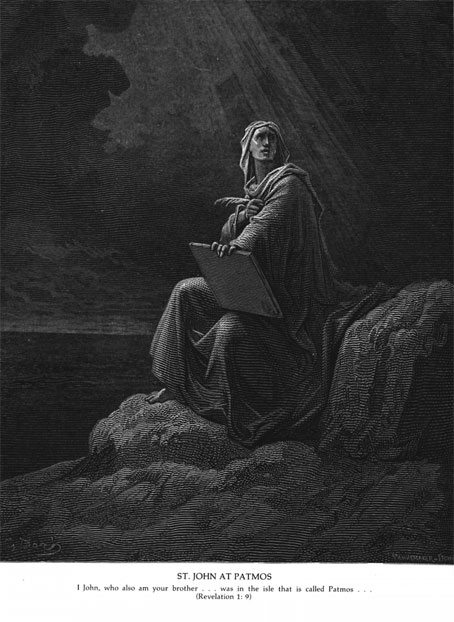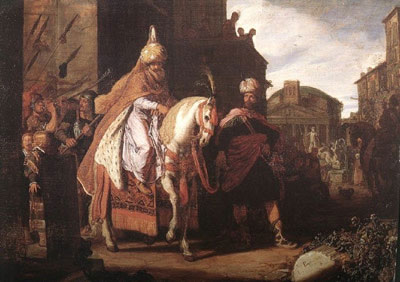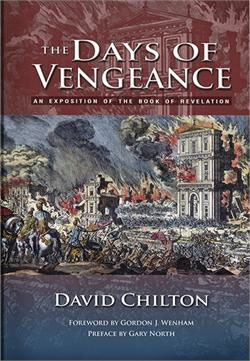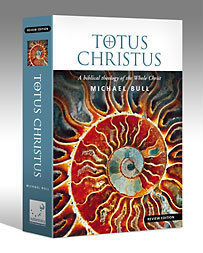Apr
28
2009
or How Modern Conservative Theologians Unwittingly Use Literary Genres to Mask Their Unbelief
One of the big problems with modern theology is its habit of categorising parts of the Bible into literary genres. For sure, the Bible contains historical prose, visions, poetry and songs. But many passages won’t actually fit into these neat little pigeon holes without hamstringing their intended purpose. And as it turns out, these “genre-lisations” are excuses to compromise with humanistic pop-philosophy and pop-history.
The three main gripes I have are misuses of the genres poetry, polemic and apocalyptic.
Continue reading
1 comment | tags: Apocalyptic, Daniel, David Field, Esther, Ezekiel, Gnosticism, Ideology, James Jordan, John Dickson, Peter Leithart, Restoration, Revelation, Rowan Williams | posted in Biblical Theology, Creation, The Last Days, The Restoration Era
Apr
16
2009
“Because of Christ we are thought of as fools, but Christ has made you wise. We are weak and hated, but you are powerful and respected. Even today we go hungry and thirsty and don’t have anything to wear except rags. We are mistreated and don’t have a place to live. We work hard with our own hands, and when people abuse us, we wish them well. When we suffer, we are patient. When someone curses us, we answer with kind words. Until now we are thought of as nothing more than the trash and garbage of this world.” 1 Corinthians 4:10-13
So, are God’s people to wear rags? Or should they be dressed well like Solomon or the woman in Proverbs 31? Or is that even the right question?
Continue reading
Comments Off | tags: Adam, Corinthians, Daniel, Ecclesiology, Ezekiel, Ezra, Joseph, Maturity, Mordecai, Nehemiah, Noah, Paul, Proverbs, Robes, Solomon | posted in Biblical Theology, Totus Christus
Apr
15
2009
Witness or Worship?
“…the political task of Christians is to be the church rather than to transform the world”–Stanley Hauerwas, Resident Aliens.
This presents a false dichotomy. When Gideon and David were faithful, God went ahead of them and defeated their enemies. Would it be fair to assume that Hauerwas is just saying that political activism is getting the cart before the horse? If so, then I agree with him. When the church is faithful, the blessings of God transform the world around her.
Continue reading
Comments Off | tags: Aaron, Ark of the Covenant, David, Ezekiel, Gideon, Holy Place, James Jordan, Manna, Politics, Table of Showbread | posted in Biblical Theology, Ethics
Apr
13
2009
And He said to me, “Son of man, stand on your feet, and I will speak to you.” Then the Spirit entered me when He spoke to me, and set me on my feet; and I heard Him who spoke to me. And He said to me: “Son of man, I am sending you to the children of Israel, to a rebellious nation that has rebelled against Me; they and their fathers have transgressed against Me to this very day. (Ezekiel 2:1-3)
I started Hebrew lessons this week. We’ll see how long I last! Anyhow, my teacher made a comment about Ezekiel 2:1. Apparently, the phrase translated “I will speak to you” is actually a gloss. Literally, it says, I will speak you. The Lord gives Ezekiel a scroll to eat and sends him as son of man against Jerusalem.
So, as son of man, Ezekiel is the living, walking WORD. He is the Law written on tablets of flesh.
Comments Off | tags: Exile, Ezekiel, Hebrew, Translation | posted in Biblical Theology
Apr
11
2009

There are conflicting traditions concerning John. A widely held opinion is that he was banished to Patmos by the Emperor Domitian who reigned from AD 81 through 96. If so, this makes preterism a paper tiger.
Continue reading
Comments Off | tags: Bible history, Church History, David Chilton, Ezekiel, John, Kenneth Gentry, Literary Structure, Preterism | posted in The Last Days
Apr
10
2009
Saul and Agag
 I puzzled over Ezekiel chapters 38 and 39 for years. Bible commentators suggested many things but nothing seemed to fit the historical context of the surrounding chapters. It seems James B. Jordan was the first to put the pieces together.1
I puzzled over Ezekiel chapters 38 and 39 for years. Bible commentators suggested many things but nothing seemed to fit the historical context of the surrounding chapters. It seems James B. Jordan was the first to put the pieces together.1
Continue reading
Comments Off | tags: Amalek, Atonement, Babylon, Bible history, Esther, Ezekiel, Gary DeMar, Haman, James Jordan, Mordecai, Saul, Typology | posted in Against Hyperpreterism, Biblical Theology, The Last Days, Totus Christus
Apr
10
2009
Land.

I read David Chilton’s The Days of Vengeance in 1989, and it sure surprised me to learn that the word ‘earth’ in the Bible also means ‘land.’ This simple fact alters the scope of John’s Revelation entirely. It is about God’s ending of the Covenant He restored after the Babylonian captivity, and so first century Judah is the main subject. It was a repeat of events in Jeremiah’s day, so let’s backtrack a little…
Continue reading
15 comments | tags: AD70, Bible history, Compromise, David Chilton, Dispensationalism, Exile, Ezekiel, Noah, Resurrection, Temple | posted in Against Hyperpreterism, Biblical Theology, The Last Days, The Restoration Era
Apr
10
2009
“For the eyes of the Lord run to and fro throughout the whole earth, to give strong support to those whose heart is blameless toward him.” (2 Chronicles 16:9)
 Like Joshua’s spies, Ezekiel and the Lord had spied out Jericho. The “seeing” was now over. The Temple had been measured right down to the hidden things. Judgment always begins at God’s house, so the Lord called for the Levite executioners and ordered them to begin their slaughter at the Temple. Six men with weapons appeared from the north gate, the gate of sacrifice. With a seventh man in linen, the men would pass through the city as seven trumpets, announcing its destruction. They stood beside the bronze altar, ready to offer the people as an atonement for the innocent blood shed on the Land. With that allusion to Abel, we next have an allusion to Cain. Cain was shown mercy and given a mark on his forehead to prevent his execution for the murder of his brother. As Samuel anointed David with oil from a horn from the Tabernacle, those who cried for the abominations committed in the Land were marked for mercy from the man’s inkhorn. These were marked with a tav —a Hebrew t—a cross, the seal of the Spirit.
Like Joshua’s spies, Ezekiel and the Lord had spied out Jericho. The “seeing” was now over. The Temple had been measured right down to the hidden things. Judgment always begins at God’s house, so the Lord called for the Levite executioners and ordered them to begin their slaughter at the Temple. Six men with weapons appeared from the north gate, the gate of sacrifice. With a seventh man in linen, the men would pass through the city as seven trumpets, announcing its destruction. They stood beside the bronze altar, ready to offer the people as an atonement for the innocent blood shed on the Land. With that allusion to Abel, we next have an allusion to Cain. Cain was shown mercy and given a mark on his forehead to prevent his execution for the murder of his brother. As Samuel anointed David with oil from a horn from the Tabernacle, those who cried for the abominations committed in the Land were marked for mercy from the man’s inkhorn. These were marked with a tav —a Hebrew t—a cross, the seal of the Spirit.
The man with the inkhorn wore linen, which implies two things: he was the high priest, and it was the day of atonement. Ezekiel didn’t realise it at the time, but when he saw this man, he was looking at himself (Ezekiel 43:3).
Comments Off | tags: Cain, Ezekiel, Jericho, Temple | posted in Totus Christus
Apr
10
2009
 Nebuchadnezzar fought hard against historical Tyre, but was not able to plunder it. Was Ezekiel wrong? Or does Ezekiel’s prediction of Tyre’s total destruction support the identification of the subject of this prophesy as Judah? It was Judah whose (bronze) pillars were brought down and her foundations made a bare rock. The Lord would instead pay his faithful Babylonian “servant” with the riches of Egypt (29:19-20).
Nebuchadnezzar fought hard against historical Tyre, but was not able to plunder it. Was Ezekiel wrong? Or does Ezekiel’s prediction of Tyre’s total destruction support the identification of the subject of this prophesy as Judah? It was Judah whose (bronze) pillars were brought down and her foundations made a bare rock. The Lord would instead pay his faithful Babylonian “servant” with the riches of Egypt (29:19-20).
The imagery of Pharaoh’s descent to Sheol in chapter 32 has the Exodus in mind. Egypt’s armies would be swallowed by Babylon in the way Pharaoh’s armies drowned in the Red Sea. All the uncircumcised nations would welcome him to hell, and Egypt is the last army to be drowned and made unable to cross over into the new world the Lord was creating.
Of the imagery reprised in Revelation, the foremost is that of a dragon of the Nile, most likely a crocodile. Pharaoh thought he was secure in the fertility of the river, but the Lord would put hooks in his jaws and throw him into the wilderness. The crocodile would be food for birds and beasts, a Covenant curse. Ezekiel is once again making a veiled insult against the king of Israel, using Pharaoh’s behaviour as an object lesson. Israel’s mission was to bring the river of life to the nations but she had instead brought them harm. Like the real Egypt, the nations had leaned on Israel as a crutch, and she had only brought them injury. For this, Egypt/Israel would be made desolate, then restored from captivity. But because she had usurped the Lord’s throne, she would forever be a vassal kingdom.
As Tyre, Solomon’s gold was stolen by foreigners. As Sidon, his oppressive taxation was cut off. And as Egypt, his many wives were taken captive and the horses he had imported from Egypt were finally drowned in the sea. The word of the Lord is sure.
Comments Off | tags: Babylon, Ezekiel, Nebuchadnezzar, Pharaoh, Revelation, Tyre | posted in Biblical Theology, Totus Christus
Apr
8
2009
“…and I came to Jerusalem and discovered the evil that Eliashib had done for Tobiah, in preparing a room for him in the courts of the house of God. And it grieved me bitterly; therefore I threw all the household goods of Tobiah out of the room. Then I commanded them to cleanse the rooms; and I brought back into them the articles of the house of God, with the grain offering and the frankincense.” Nehemiah 13:7-9
After the failure of Israel’s kings and their adulterous priesthood, God established new worship in the “wilderness” of Babylon under Daniel and Ezekiel. When Babylon fell, He brought His new Jerusalem, like a pure bride, back to the mountain of God.
Continue reading
Comments Off | tags: Apostasy, Compromise, Daniel, Ezekiel, Ezra, Man of sin, Nehemiah, Priesthood | posted in The Restoration Era





























